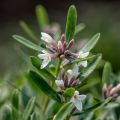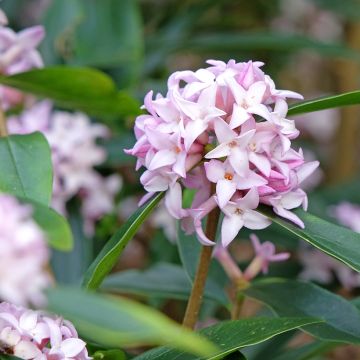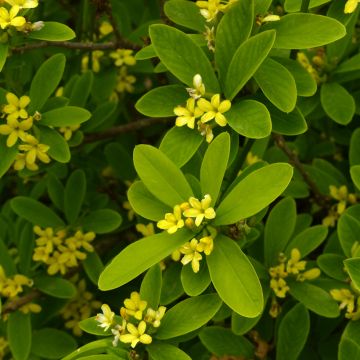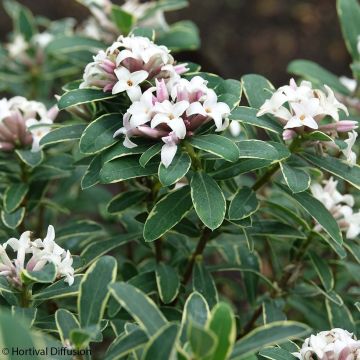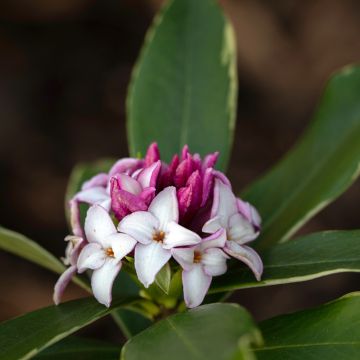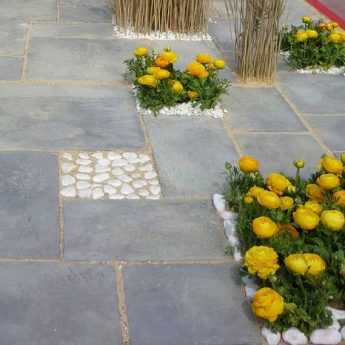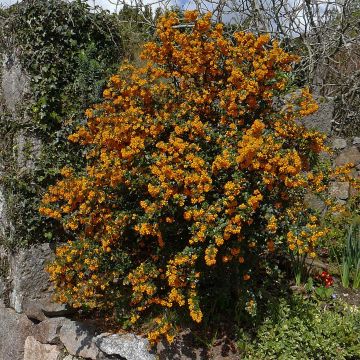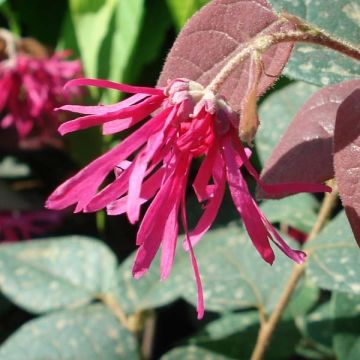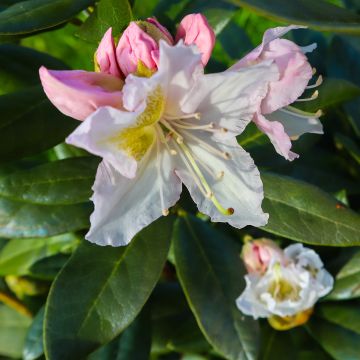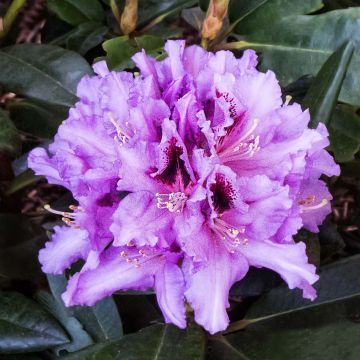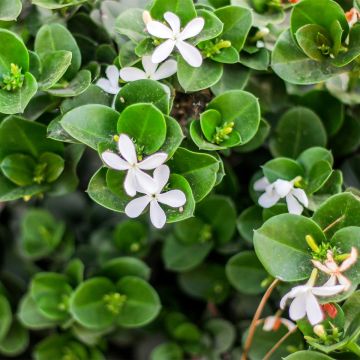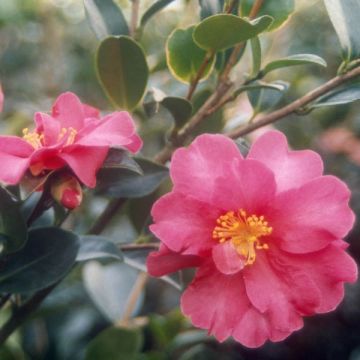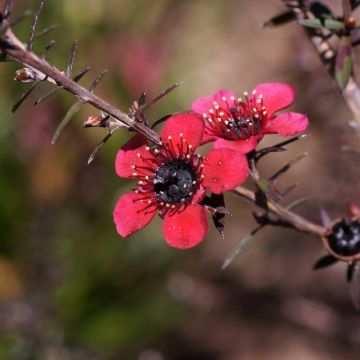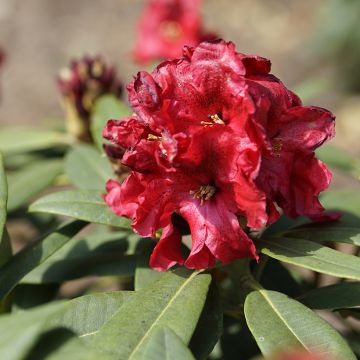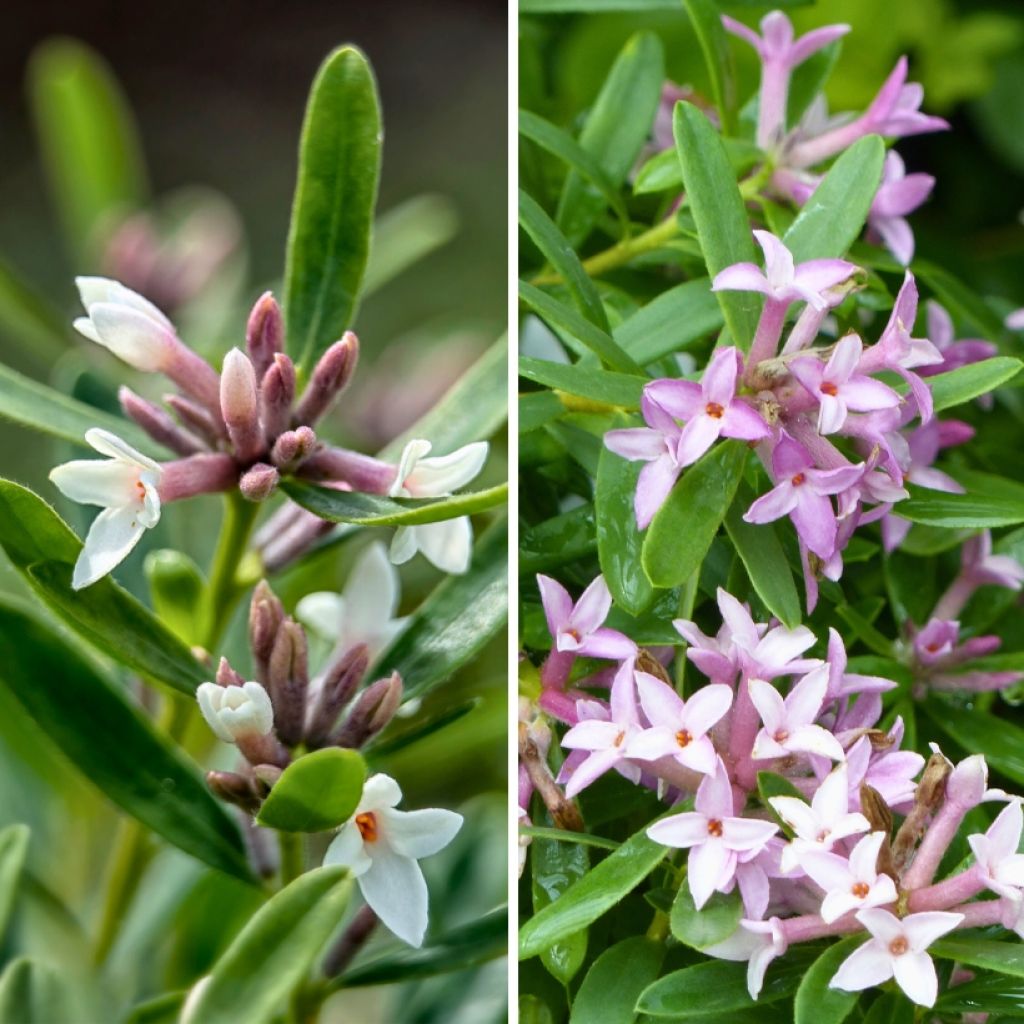

A pair of fragrant Daphne
A pair of fragrant Daphne
Daphne x transatlantica Eternal Fragrance® 'Blafra', Pink Fragrance® 'Blapink'
Eternal Fragrance, Blafra
This plant carries a 24 months recovery warranty
More information
We guarantee the quality of our plants for a full growing cycle, and will replace at our expense any plant that fails to recover under normal climatic and planting conditions.
Does this plant fit my garden?
Set up your Plantfit profile →
Collection items (2 plants)
Description
This highly fragrant Duo of Daphnes brings together two excellent hybrid varieties that distinguish themselves by the duration of their flowering and the intensity of their fragrance. These shrubs, measuring 80 cm in all directions, have a naturally compact and bushy habit and are in bloom from the heart of spring until the beginning of summer, and again from the end of summer until the first frost, for 5 to 6 months. Requiring little maintenance, evergreen even in winter, beautifully scented, and not taking up much space, these daphnes are true gems for the garden or terrace, in non-calcareous soil.
The duo consists of:
x 1 Daphne x transatlantica Eternal Fragrance® 'Blafra': this bush plant captivates with its white flowers exuding an intense fragrance. Its evergreen foliage and generous flowering from spring to autumn make it a choice specimen for gardens of all sizes.
x 1 Daphne x transatlantica Eternal Fragrance Pink® 'Blapink': this variety catches the eye with its pink, fragrant, and long-lasting flowers, blooming on dark green foliage. Its ability to bloom abundantly at various times of the year will be appreciated in pots as well as in borders.
The 'Eternal Fragrance' and 'Eternal Fragrance Pink' Daphnes are best planted in spring or autumn, in well-drained soil, rich in humus, which remains slightly moist in summer, in a sunny to semi-shady location. For a scented border or bed, plant them with a distance of 60 cm between each plant. In pots, make sure to provide adequate drainage to avoid excess moisture. These plants not only have an ornamental role but also contribute to biodiversity by attracting pollinators.
The Daphnes in this duo harmoniously combine with 'Palace Purple' Heuchera, which adds a beautiful touch of purple beneath their green foliage. A perennial geranium, such as 'Rozanne', with its blue-violet flowers and attractive foliage, pairs perfectly with the Daphnes. A 'The Fairy' ground cover rose will complete this bucolic scene with its long-lasting pink flowering. These companions, strategically placed, bring diversity and contrast for a visually stunning display. The geranium and heuchera will be placed in front of the shrubs, while the rose will structure the background.
Report an error about the product description
Plant habit
Flowering
Foliage
Safety measures
Botanical data
Daphne
x transatlantica
Eternal Fragrance® 'Blafra', Pink Fragrance® 'Blapink'
Thymelaceae
Eternal Fragrance, Blafra
Cultivar or hybrid
ingestion
Cette plante est toxique si elle est ingérée volontairement ou involontairement.
Ne la plantez pas là où de jeunes enfants peuvent évoluer, et lavez-vous les mains après l'avoir manipulée.
Pensez à conserver l'étiquette de la plante, à la photographier ou à noter son nom, afin de faciliter le travail des professionnels de santé.
Davantage d'informations sur https://plantes-risque.info
Other Daphne
View all →Planting and care
Daphne x transatlantica should be planted in spring or autumn in humus-bearing and well-drained, acid to neutral soil, free from limestone. The soil should remain moist even in summer, but should never be waterlogged. It prefers a sunny to semi-shaded exposure. Pruning is unnecessary except for dead branches. Do not let the soil dry out, apply an organic mulch or plant heathers to protect its base.
Pot cultivation is entirely possible: plant your daphne in good horticultural soil, making sure to place a layer of clay pebbles at the bottom of the perforated pot to facilitate drainage. Water regularly with non-limestone water and apply fertiliser for acid-loving plants. Like Daphne odora, it can be affected by Marsonia; treat it preventively with a fungicidal in spring, before flowering.
Planting period
Intended location
Care
Planting & care advice
This item has not been reviewed yet - be the first to leave a review about it.
Similar products
Haven't found what you were looking for?
Hardiness is the lowest winter temperature a plant can endure without suffering serious damage or even dying. However, hardiness is affected by location (a sheltered area, such as a patio), protection (winter cover) and soil type (hardiness is improved by well-drained soil).

Photo Sharing Terms & Conditions
In order to encourage gardeners to interact and share their experiences, Promesse de fleurs offers various media enabling content to be uploaded onto its Site - in particular via the ‘Photo sharing’ module.
The User agrees to refrain from:
- Posting any content that is illegal, prejudicial, insulting, racist, inciteful to hatred, revisionist, contrary to public decency, that infringes on privacy or on the privacy rights of third parties, in particular the publicity rights of persons and goods, intellectual property rights, or the right to privacy.
- Submitting content on behalf of a third party;
- Impersonate the identity of a third party and/or publish any personal information about a third party;
In general, the User undertakes to refrain from any unethical behaviour.
All Content (in particular text, comments, files, images, photos, videos, creative works, etc.), which may be subject to property or intellectual property rights, image or other private rights, shall remain the property of the User, subject to the limited rights granted by the terms of the licence granted by Promesse de fleurs as stated below. Users are at liberty to publish or not to publish such Content on the Site, notably via the ‘Photo Sharing’ facility, and accept that this Content shall be made public and freely accessible, notably on the Internet.
Users further acknowledge, undertake to have ,and guarantee that they hold all necessary rights and permissions to publish such material on the Site, in particular with regard to the legislation in force pertaining to any privacy, property, intellectual property, image, or contractual rights, or rights of any other nature. By publishing such Content on the Site, Users acknowledge accepting full liability as publishers of the Content within the meaning of the law, and grant Promesse de fleurs, free of charge, an inclusive, worldwide licence for the said Content for the entire duration of its publication, including all reproduction, representation, up/downloading, displaying, performing, transmission, and storage rights.
Users also grant permission for their name to be linked to the Content and accept that this link may not always be made available.
By engaging in posting material, Users consent to their Content becoming automatically accessible on the Internet, in particular on other sites and/or blogs and/or web pages of the Promesse de fleurs site, including in particular social pages and the Promesse de fleurs catalogue.
Users may secure the removal of entrusted content free of charge by issuing a simple request via our contact form.
The flowering period indicated on our website applies to countries and regions located in USDA zone 8 (France, the United Kingdom, Ireland, the Netherlands, etc.)
It will vary according to where you live:
- In zones 9 to 10 (Italy, Spain, Greece, etc.), flowering will occur about 2 to 4 weeks earlier.
- In zones 6 to 7 (Germany, Poland, Slovenia, and lower mountainous regions), flowering will be delayed by 2 to 3 weeks.
- In zone 5 (Central Europe, Scandinavia), blooming will be delayed by 3 to 5 weeks.
In temperate climates, pruning of spring-flowering shrubs (forsythia, spireas, etc.) should be done just after flowering.
Pruning of summer-flowering shrubs (Indian Lilac, Perovskia, etc.) can be done in winter or spring.
In cold regions as well as with frost-sensitive plants, avoid pruning too early when severe frosts may still occur.
The planting period indicated on our website applies to countries and regions located in USDA zone 8 (France, United Kingdom, Ireland, Netherlands).
It will vary according to where you live:
- In Mediterranean zones (Marseille, Madrid, Milan, etc.), autumn and winter are the best planting periods.
- In continental zones (Strasbourg, Munich, Vienna, etc.), delay planting by 2 to 3 weeks in spring and bring it forward by 2 to 4 weeks in autumn.
- In mountainous regions (the Alps, Pyrenees, Carpathians, etc.), it is best to plant in late spring (May-June) or late summer (August-September).
The harvesting period indicated on our website applies to countries and regions in USDA zone 8 (France, England, Ireland, the Netherlands).
In colder areas (Scandinavia, Poland, Austria...) fruit and vegetable harvests are likely to be delayed by 3-4 weeks.
In warmer areas (Italy, Spain, Greece, etc.), harvesting will probably take place earlier, depending on weather conditions.
The sowing periods indicated on our website apply to countries and regions within USDA Zone 8 (France, UK, Ireland, Netherlands).
In colder areas (Scandinavia, Poland, Austria...), delay any outdoor sowing by 3-4 weeks, or sow under glass.
In warmer climes (Italy, Spain, Greece, etc.), bring outdoor sowing forward by a few weeks.



































